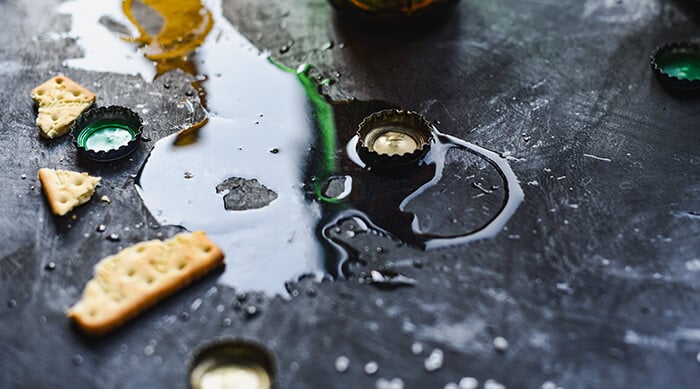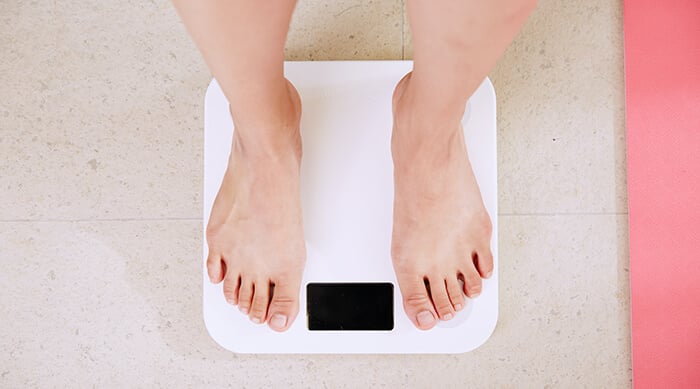We drink to celebrate life events, feel brave, relax, or change the way we feel… but alcohol and emotions don’t always mix.
Alcohol consumption can leave a temporary positive impact on our mood, but alcohol misuse can lead to serious mental health conditions, coma, and even death. These problems are even more likely, especially in young people, when combined with the prescription drugs, over-the-counter drugs or the use of multiple illicit substances.
The benefits of cutting out alcohol vary from person to person depending on how much alcohol they regularly consumed before quitting. If binge drinking was your thing, you’re likely to experience the most benefits from not drinking alcoholanymore.
Quick note: In the research we discuss below, “heavy drinking” refers to consuming more than 14 drinks per week (for men) and more than 7 drinks per week (for women).
Alcohol’s negative impact on well-being goes beyond the obvious physical health problems, like heart disease or cancer.
What does drinking do to your emotions? Drinking alcohol can negatively impact your emotions, worsening anxiety, depression, stress, and even suicidal thoughts. Short-term alcohol use increases your brain’s “happy chemicals,” like dopamine and serotonin, but can then have negative effects on these same brain chemicals in the long-term.
Let’s talk about the relationship between alcohol dependence and its negative effects on mental health.
Table of Contents
Why do people drink to affect their emotions?
Does alcohol help with anxiety?
Will drinking make depression worse?
Alcohol, Self-Harm, and Suicide
Other Ways Alcohol Impacts Emotions
Can drinking actually improve mental health?
Why do people drink to affect their emotions?
Do people drink to forget their emotions? Yes, some people drink to forget or avoid their emotions. Human beings instinctively want to reduce the experience of negative emotions and escape from feelings that we don’t want to have.
What are the most common emotions people drink to avoid? People use alcohol to avoid emotions like sadness, anger, embarrassment, and disappointment, caused by situations like:
- challenging life events
- a break-up
- the loss of a loved one
- Illness
- memories of trauma
However, these short-term positive emotions come at a cost. Getting rid of your inhibitions for a night might make it easier to face tough social situations. However, intentionally worsening your decision-making skills can also result in a lot of regret once the buzz wears off.
Do true feelings come out when you’re drunk? True feelings may come out when you’re drunk, but this isn’t necessarily true all the time. Instead, alcohol can make people make fake stories and react with emotions they don’t feel.
As it turns out, lowered inhibitions and impaired judgment aren’t exactly a recipe for truth-telling — drunk words are notsober thoughts.
What are the long-term effects of alcohol on emotions? The long-term effects of alcohol on emotions include:
- learning deficits
- increased stress
- social anxiety
- aggressive behavior
- impaired memory
- mental disorders
- sleep disturbances
- other cognitive damage
Alcohol and Brain Chemistry
As a powerful drug, alcohol affects a number of neurological pathways and causes tremendous changes in the brain. And we’re not just talking about getting a hangover the next day.
Alcohol directly impacts brain chemistry by depressing the central nervous system and destroying brain cells. It also alters neurotransmitter levels.
Neurotransmitters are the chemical messengers that convey signals throughout the body to control thought processes and your emotional state. Dopamine is one of the chemical messengers that impacts emotions and is affected by the presence of alcohol.
Alcohol misuse exhausts the amount of dopamine in your brain and lays the groundwork for alcohol addiction.
Stress and Drinking Alcohol
The feeling of stress is triggered by normal life events, trauma, and everything in between. Common causes of stress include:
- long working hours and/or a stressful work environment
- speaking in front of an audience
- chronic illness
- financial trouble
- grief and loss
- family drama
- difficult or controversial world events, such as the coronavirus pandemic
- lack of confidence
- a poor support system
Although unwinding with alcohol may sound like a good idea, it actually makes you less able to deal with stress.
“It isn’t okay to drink regularly to relieve stress,” says Dr. Kirtly Jones at the University of Utah Health. She adds that alcohol interferes with your ability to make sound decisions in the moment and impacts how well you cope with stress tomorrow.
Put simply, alcohol is not a solution to a high-stress season of life. Especially when there are so many better ways to unwind.
Read Next: Why Wine Causes Bloating & How to Prevent It
Does alcohol help with anxiety?
Alcohol can temporarily relieve anxiety. But drinking alcohol can quickly turn into an unhealthy coping mechanism that people use to lessen anxiety symptoms.
A 2012 study concluded that anxiety and alcohol use disorders usually occur together.
If you have a diagnosed anxiety disorder, drinking alcohol is risky. This is because having an anxiety disorder puts you at a higher risk of developing an alcohol use disorder.
Reducing your anxiety risk is one of the best reasons not to drink.
Will drinking make depression worse?
Drinking can make depression worse, increasing your risk for persistent negative feelings and providing a false sense of contentment.
Because alcohol is a depressant, it changes the chemical makeup in your brain and alters your mood, thoughts, and feelings. Alcohol alters how your brain cells signal to each other, making you feel relaxed.
For that reason, people who face feelings of depression often use alcohol to help ease symptoms.
Unfortunately, alcohol use promotes depression. Drinking seems to be the cause, not the effect, of major depressive disorder.
A study following a large group of people in Canada found that those diagnosed with alcohol dependence (alcohol use disorder) were at a higher risk for depression.
Alcohol, Self-Harm, and Suicide
There is a strong relationship between alcohol misuse and the risk of suicide and death from suicide.
One study found that those who commit suicide are often intoxicated at their time of death. The same study also revealed that alcohol intoxication increases suicide risk up to 90 times compared to alcohol abstinence.
Another coping skill people use to tackle emotional discomfort is self-harm. Alcohol misuse is associated with self-harm, particularly in female adults.
A 2022 study found that drinking and smoking together increased the chances of suicidal ideation in Latinx people.
If someone is prone to self-harm and experiences anger, it can impair their ability to use healthy coping skills, driving them to harmful behaviors. According to a 2015 study, adolescents who self-harmed were at higher risk of substance abuse.
Other Ways Alcohol Impacts Emotions
Alcohol abuse devastates lives, marriages, and families. One study found that heavy drinking increased the risk of adverse interactions among couples and young adults.
To make matters worse, people fighting substance abuse tend to lie about their condition to reduce the negative impact on their families. Unfortunately, this puts even more strain on interfamily relationships.
Memory loss and other cognitive issues are other common side effects of alcohol misuse. Studies show that the more a person drinks alcohol, the deeper the extent of their memory issues.
Heavy drinkers encounter more than 30% more memory-related issues than someone who doesn’t drink.
For people at risk of PTSD or other trauma-related disorders, frequently drinking over time can chemically impair the ability to regulate fear responses. In these cases, the emotional impact of fear is magnified due to the long-term effects of alcohol, increasing the risk for trauma disorders.
People in early alcohol abuse recovery actually have trouble distinguishing discrete emotions. This inability to separate the differences between negative emotions is one reason relapse is so common in the few months immediately after getting sober.
Can drinking actually improve mental health?
A few drinks every once in a while can have a temporary positive impact on your mental health, but more than that is likely to have a negative impact on your emotions.
Is it possible to drink your emotions away? No, you can’t drink your feelings away with alcohol. Alcohol can mask the severity and reality of your feelings, but ultimately, that numbing effect is a short-term solution.
Small amounts of alcohol increase affective expression, talkativeness, cheerfulness, and pleasant feelings. Moderate drinking can make you feel happy, releasing dopamine and stimulating your emotions.
But alcohol disrupts the balance of other chemicals, including serotonin. Serotonin is a chemical that helps to control your mood.
People with alcoholism often metabolize serotonin differently than non-alcoholics.
Genetics, family history, race, and gender all impact how serotonin is processed, meaning that your risk of developing alcohol use disorder is complex and unique.
Occasionally drinking a beer or taking a shot in social situations probably won’t harm you. But it’s scientifically impossible to predict how your body and brain will respond to long-term drinking habits.
Be intentional with your decisions on alcohol and be aware of how much alcohol you consume.
Healthy Ways to Deal With Negative Emotions
Anger, frustration, resentment, hate, and other negative emotions are all part of the human experience. They can all lead to stress, and it’s easy to ignore them as a coping mechanism.
The good news is that there are many healthy ways to deal with negative emotions, like:
- Professional therapy, like cognitive-behavioral therapy (CBT), talk therapy, and EMDR
- Exercise and other physical activity (aerobics are especially great for addressing anxiety)
- Consuming foods, drinks, and dietary supplements proven to reduce depression symptoms
- Putting your feelings into words
- Spending time outside, which increases vitamin D levels and calms stress
- Reducing screen time
- Emphasizing personal relationships with supportive friends and family
- Addressing major stressors that you can change, such as an unhealthy work environment or communication problems in your relationships
- Taking time to meditate and practice mindfulness
How to Stay in Control of Drinking and Your Emotions
Are you concerned about your alcohol intake and the emotional effects of alcohol? Consider that it might be time to cut back. Whether you stop drinking altogether or just practice a sober curious lifestyle, you’re likely to find your emotions are easier to regulate.
And we have great news: Drinking less alcohol doesn’t have to mean breaking up with wine.
Non-Alcoholic Sparkling Rosé

$24.99
Award-winning non-alcoholic California sparkling rosé with crisp, light notes of strawberry, peach & raspberry. Rosé all day without the hangover.TASTING NOTES: Flavors of soft strawberry, peach, and raspberry notes are balanced with a light acid for a full finish.FOOD PAIRINGS:… Read More
Surely offers a creative selection of alcohol-removed wines to satisfy every wine lover’s cravings, from canned Brutto sauvignon blanc and our original sparkling rosé.
Sources
- Acute alcohol intoxication
- Risky Drinking in Adolescents and Emerging Adults: Differences between Individuals Using Alcohol Only versus Polysubstances
- Alcoholism and its effects on the central nervous system
- Overview: Stress and Alcohol Use Disorders Revisited
- Anxiety and Alcohol Use Disorders
- Alcohol and depression: Evidence from the 2014 health survey for England
- Alcohol and depression
- Alcohol consumption and major depression in the general population: the critical importance of dependence
- Alcohol Use Disorder and Risk of Suicide in a Swedish Population-Based Cohort
- Alcohol and suicidal behavior
- Alcohol use and misuse, self-harm and subsequent mortality: an epidemiological and longitudinal study from the multicentre study of self-harm in England
- Emotion Dysregulation and Hazardous Drinking in relation to Suicidal Ideation among Spanish-Speaking Latinx Daily-Smokers - PMC
- Substance use in adulthood following adolescent self-harm: a population-based cohort study
- Concordant and discordant alcohol, tobacco, and marijuana use as predictors of marital dissolution
- What Happened? Alcohol, Memory Blackouts, and the Brain
- Chronic alcohol remodels prefrontal neurons and disrupts NMDA receptor-mediated fear extinction encoding
- Emotion differentiation in early recovery from alcohol use disorder: Associations with in‐the‐moment affect and 3‐month drinking outcomes
- Variation in the Serotonin Transporter Gene and Alcoholism: Risk and Response to Pharmacotherapy
- Differential impact of serotonin transporter activity on temperament and behavior in persons with a family history of alcoholism in the Oklahoma Family Health Patterns project
- Physical activity and emotional intelligence among undergraduate students: a correlational study
- Aerobic Exercise Decreases Negative Affect by Modulating Orbitofrontal-Amygdala Connectivity in Adolescents
- Putting Feelings Into Words
- Physical activity, leisure-time screen use and depression among children and young adolescents
- [The impact of mindfulness meditation on anger.]






